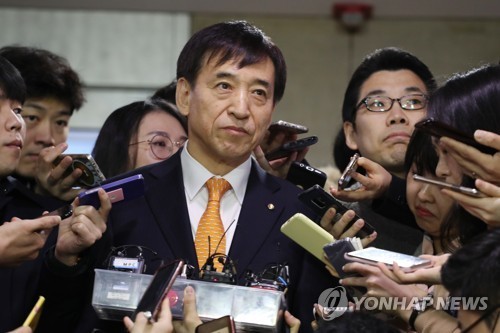
"The U.S. Federal Reserve's decision met market expectations, and as a result, the U.S. market remained steady," Bank of Korea (BOK) Gov. Lee Ju-yeol told reporters before attending an emergency meeting with officials in Seoul. "In South Korea, I expect that the financial market will have little impact from the Fed's decision."
The U.S. central bank raised its policy rate to 1.50-1.75 percent on Wednesday as widely expected and has plans to increase the rate two more times within the year.
Lee said the Fed will likely maintain its rate hike schedule for 2018, but its tone may have become hawkish.
"For next year, the Fed may speed up its tightening approach. I think the decision at the Federal Open Market Committee can be interpreted as being more hawkish," he said.
He said the central bank will keep closer tabs on the financial and economic issues at home and abroad, and seek the best timing to lift the rate from 1.5 percent as South Korea has a lower base rate than that of the U.S. for the first time in more than 10 years.
The BOK is scheduled to hold its monetary policy meeting in May.
"We have to check many things before setting the timing of a rate increase," said Lee, adding that the BOK will issue a revised GDP forecast next month.
The top banker has stressed that he will keep the monetary policy accommodative for a while as Asia's fourth-largest economy has been experiencing a lukewarm recovery and low inflation pressure.
Lee will start his second four-year term in April as his reappointment was approved by the National Assembly on Wednesday.
Deputy Finance Minister Ko Hyung-kwon also said there is little chance of capital outflow due to a reversal of key interests between the world's top economy and South Korea that could destabilize the local financial market.
With the hike, America's benchmark interest rate is higher than that of South Korea. In November, 2017, the BOK lifted its key rate by a quarter percentage point to 1.5 percent amid clear signs of an economic recovery, ending the 16-month streak of its wait-and-see stance.
The situation has stoked concerns that it could result in a sharp capital outflow.
"Market concerns over a sharp rate hike have eased, but we need to remain vigilant," Ko said during a meeting with officials from other financial authorities.
The deputy minister said the government will take swift and decisive actions, if necessary, to stabilize the markets. Source from the Yonhap.
























